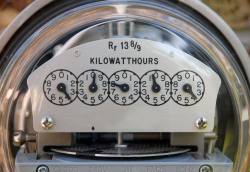The consumer group Which? has today called for “an immediate halt to the smart meter roll-out” as it believes a full review of the plans are needed before the second phase starts in 2014.

Dial meters like this one will be replaced by Smart Meters with digital displays, but is forcing them on consumers too much?
As we reported back in March last year, the DECC has already set out its plans for a nationwide smart meter rollout during the years 2014 – 2019, calling it “a crucial step in delivering the UK’s energy security and low carbon future”.
Currently we are in the ‘foundation stage’, where domestic consumers and businesses have to choose to install a smart meter, with the costs of installation and hardware built in to their bills or paid for upfront. However, the government is planning a forced ‘mass rollout’ from 2014 – the proposed second stage.
The DECC said that during the foundation stage “the Government will work with industry, consumer groups and other stakeholders to ensure all the necessary groundwork is done for the second stage”. This has clearly failed so far if the largest consumer watchdog (Which?) is campaigning publicly to get the proposals looked at again.
“The government must not write a blank cheque on behalf of every energy customer, especially at a time when millions of people are struggling to pay their bills.” said Richard Lloyd, Executive Director of Which?
Cost effective?
Which? says the campaign was sparked due to consumers raising concerns about the cost effectiveness of programme. The DECC said back in March 2011 that the average household would save “around £23 per year on their energy bill as a result of smart metering”. All of the big six suppliers hiked their energy prices again this winter, by around 10-20% in most cases, pushing annual bills up towards the £1200 mark.
Business users will also be required to have smart meters installed after 2014. At Utilities Savings we have implemented many smart meter installations, but usually they are due to the business using enough energy to warrant the costs of installation – the savings are large enough and the payback period is reasonable, so the company chooses to do it for financial reasons.
If you are only spending £1,000 a year and it costs £500 to buy and install the meter, then most companies would rather just keep on top of their meter readings to prevent inaccurate estimated bills. What do you think?
Sources:
Which? – Time to stop and review the smart meter rollout
DECC – Press Release 31/03/2011
DECC – Smart Meters
